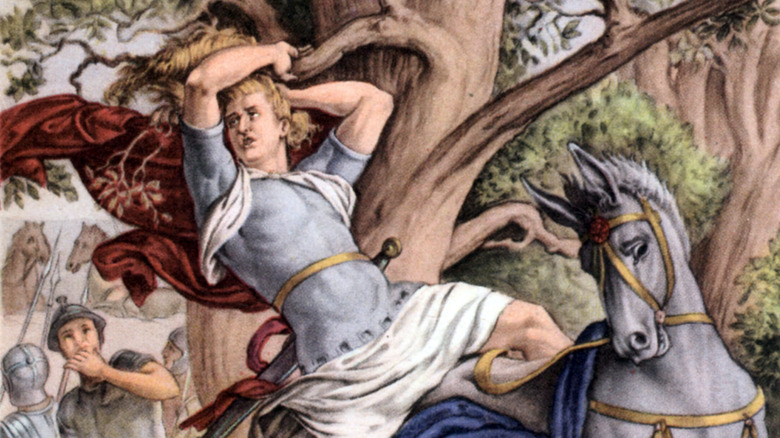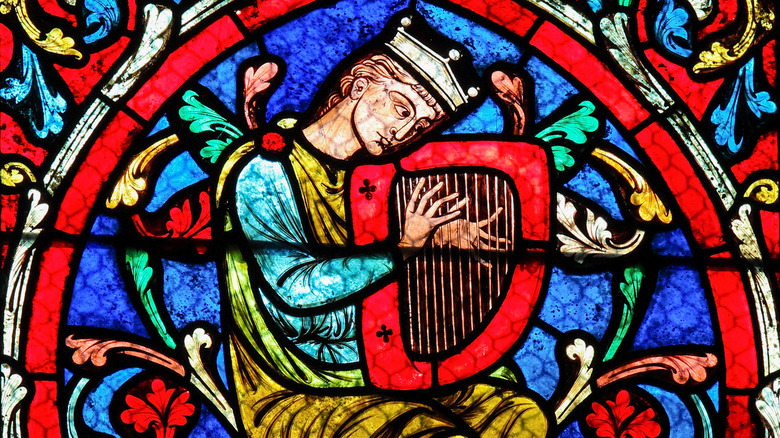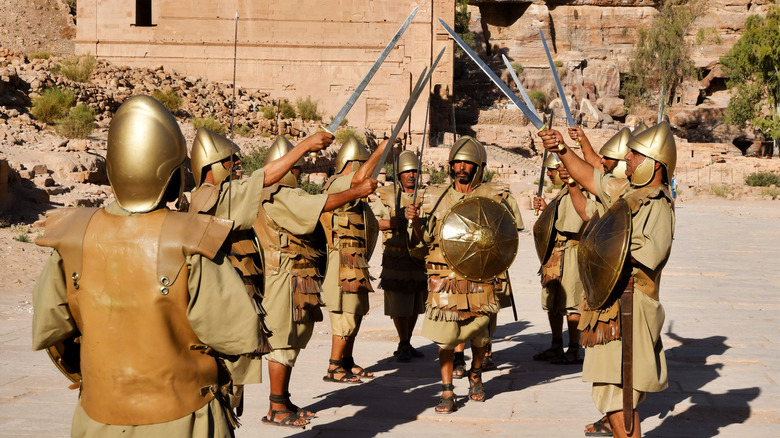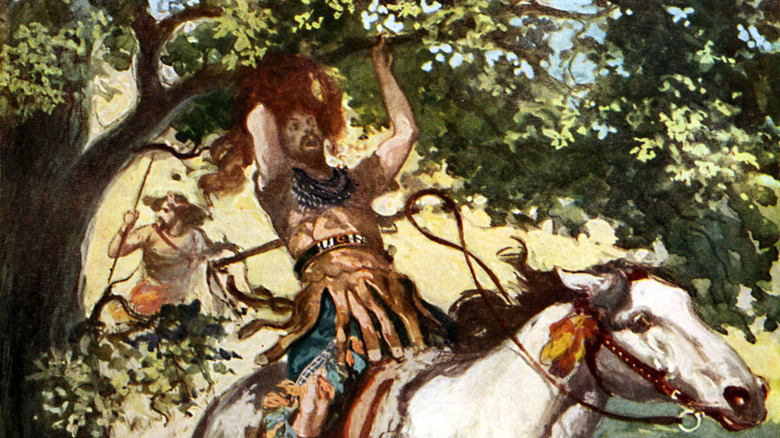The Untold Truth Of Absalom
The Bible is not a work of fiction, not in the way we use the word. Modern fiction takes a deep interest in who a person is, in mapping a character's emotions, thoughts, and motives. The men who wrote the Bible did not have the privilege of having gotten to know Madame Bovary or Don Quixote or Harry Potter before they sat down to write; they wrote about characters at arm's length, and as a result many people in both the Old and New Testaments come across as devoid of personality, boring and flat.
Nevertheless, sometimes the Biblical authors wrote about people so charismatic that their personalities alone were enough to change history. We get a flash of these people's interior life, and what little we see captivates us. King David, the king of Israel (likely real, per Britannica) might be the most famous of these. Impetuous, chivalrous, selfish, creative, the soldier-king offers a character study unmatched in ancient literature.
Another is Absalom, David's son. His story is harder to piece together, so people often forget about him. But he's every bit his father's boy: attractive, selfish, and ambitious. The only difference is Absalom's gruesome fate.
Sons and lovers
The first mention of Absalom is in the Second Book of Samuel, chapter 13 (posted at Bible Gateway). The great King David (pictured above with his harp) had several wives, including the beautiful Bathsheba, whose husband David had murdered so he could marry her himself. This means the king had a number of children who were step- or half-siblings.
Absalom had a full sister named Tamar, who, like many of the women associated with David, was beautiful. One of Absalom and Tamar's half-brothers, named Amnon, developed an unhealthy sexual fixation on her. On the advice of a horrible friend, Amnon lured Tamar to his bed, claiming he was ill. Then he tried to seduce her, and when she rejected him, raped her.
"Then Amnon hated her exceedingly," as the King James Bible renders it, "so that the hatred wherewith he hated her was greater than the love wherewith he had loved her. And Amnon said unto her, Arise, be gone."
Absalom comforted his sister but decided to bide his time on taking revenge. First he waited two full years, saying nothing about this painful subject to anyone. Then he held a party for all his siblings and half-siblings to celebrate the end of the spring sheep shearing. Really, it was a trap for Amnon: when the young man began to look worse for wear from drink, Absalom ordered his servants to murder him.
The first exile
Absalom fled to a country called Geshur, likely in modern Syria, where his maternal grandfather was still the king (per the Jewish Encyclopedia). David was distraught to see that his son Amnon had been killed. It must have been a confusing moment for the king. In 2 Samuel 13:33, his servants comfort him by saying that it was only one son who died, which implies that the circumstances weren't at all clear.
Absalom stayed with his grandfather for three years while David mourned Amnon. We can read between the lines that Absalom was afraid of his famously volatile father. However, David had long forgiven his son: "And the soul of king David longed to go forth unto Absalom" (2 Sam 13:39, at Bible Gateway). In the end, Absalom returned to Jerusalem.
The young man had changed over the course of this adventure. For one thing, he had grown extravagantly handsome. 2 Samuel 14:25 says that, "In all Israel there was none to be so much praised as Absalom for his beauty: from the sole of his foot even to the crown of his head there was no blemish in him." There's also a mention of his luxurious thick hair.
But he had also begun to develop some of his father's unpleasant characteristics as well. 2 Samuel 15 notes that he lived in Jerusalem for two years without seeing his father, and that Absalom burned a nobleman's fields out of mere annoyance.
The thirst for power
Absalom was popular; attractive people often are. He was also wealthy. But his influence ended there — the Jewish Encyclopedia interprets his two-year absence from David's court in political terms, an exclusion from power. Frustrated, Absalom began to concoct a plan that was Davidesque in its recklessness: a coup d'état against his own father.
First, like a 20th-century warlord, Absalom assembled a private army. Then he began a tour of his father's kingdom, glad-handing and settling people's disputes. Says 2 Samuel 15, "When any man came nigh to him to do him obeisance, he put forth his hand, and took him, and kissed him ... so Absalom stole the hearts of the men of Israel."
The Second Book of Samuel says that this went on for 40 years. Then he struck. In the city of Hebron, Absalom proclaimed himself the new King of Israel. His father fled across the Jordan, and Absalom marched into Jerusalem, triumphant.
At war with his father
Absalom's first move as would-be king was strikingly Freudian: he claimed his father's concubines as his own. (An air of incest hangs over Absalom's story: his sister Tamar raped by their brother, Absalom himself marrying a woman named Tamar, Absalom having sex with the women who used to sleep with his father. It could well be a symbol of moral decay — or maybe not.)
His next move was to pursue David into the desert with an army of 12,000 men. Two of his advisors bickered over this move. Ahithophel urged Absalom to kill David as soon as possible, to cement his own reign; Hushai, still loyal to David, tried to find excuses for putting off a war. The impetuous Absalom followed Ahithophel's advice, but Hushai's delaying tactics gave David time to regroup.
An old soldier and adept at living like a hunted animal, as he had as a youth during the reign of King Saul, David raised his own army of exiles in the wilderness east of the Jordan. He recrossed the river into his old territory just as Absalom was marching out of Jerusalem. The two armies met at the Wood of Ephraim, where the tender David told his officers, "Deal gently for my sake with the young man, even with Absalom" (2 Sam 18:5).
'O Absalom, my son, my son!'
The fighting at the Wood of Ephraim was ugly, not least because of the bad terrain, clotted with thickets and brambles. The account at 2 Samuel 18:8 tells us that "the wood devoured more people that day than the sword devoured."
At a certain point, Absalom, mounted on a mule, seems to have turned a corner and found himself face to face with a number of enemy soldiers. He tried to gallop away, but his lovely, thick hair caught the low-hanging branch of an oak. The mule ran off, and, in the one of the most breathtaking descriptions in the Old Testament, Absalom "was taken up between the heaven and the earth" (2 Sam 18:9).
A man who saw Absalom dangling, suspended by his hair, ran to find Joab, one of David's officers. The man refused to harm Absalom, even for money, remembering David's order not to hurt his son. But Joab had other ideas. With 10 men, Joab plunged through the heavy brush until they found Absalom. Joab threw three spears into him. Then his foot soldiers tore him down and finished him off.
That night, the victorious David asked if anyone had seen his son. "And the king was much moved, and went up to the chamber over the gate, and wept: and as he went, thus he said, O my son Absalom, my son, my son Absalom! would God I had died for thee, O Absalom, my son, my son!"





